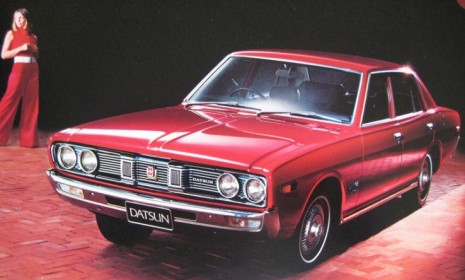The return of the 'stylish' Datsun
An automotive icon of the '70s is back, decades after its parent company tried to kill it off

A free daily email with the biggest news stories of the day – and the best features from TheWeek.com
You are now subscribed
Your newsletter sign-up was successful
The Japanese auto giant Nissan is resurrecting the Datsun, the once-ubiquitous line of roadsters that had its heyday in Britain and America in the 1970s. The new Datsuns will be released in India, Russia, and Indonesia, part of Nissan's push to expand in the fiercely competitive emerging markets. But the news is causing a buzz here, too, as nostalgic car owners recall the vehicles of their youth. Here, a guide to the return of the "stylish" Datsun:
Why were Datsuns so popular?
The peak of the Datsun's popularity came in the 1970s, as the Arab oil embargo of 1973 caused prices at the pump to spike. Datsuns stood out for being affordable and fuel-efficient, and were "packed with up-to-the-minute technology" that enticed a younger crowd, says Ray Massey at Britain's The Daily Mail. Datsuns also featured a sporty look that reminded consumers of more costly BMWs and Porsches.
The Week
Escape your echo chamber. Get the facts behind the news, plus analysis from multiple perspectives.

Sign up for The Week's Free Newsletters
From our morning news briefing to a weekly Good News Newsletter, get the best of The Week delivered directly to your inbox.
From our morning news briefing to a weekly Good News Newsletter, get the best of The Week delivered directly to your inbox.
Why were Datsuns shelved?
Nissan has owned the Datsun name since 1933, but it only began fazing it out in 1981, "as part of a global strategy to strengthen the company name," says Caroline Winter at Bloomberg Businessweek. The decision "proved to be a disaster." Everyone in the West recognized the Datsun, but few had heard of Nissan. The company's worldwide sales plummeted. Nissan likely lost hundreds of millions of dollars, and in the process fell behind its two main Japanese competitors, Toyota and Honda.
And after all that they're being brought back?
Yes. Nissan wants to compete in cheaper markets, but doesn't want to sully its current models with a lower price tag. So Nissan is dusting off the old brand and giving it another whirl. Nissan executives say the Datsun's reputation for being affordable is a perfect fit for emerging economies, where it plans to sell cars to consumers who are "up and coming" and "optimistic about the future."
A free daily email with the biggest news stories of the day – and the best features from TheWeek.com
Will it be a hit?
Datsuns still enjoy a degree of name and aesthetic recognition. And the middle class in Indonesia, India, and Russia is only expected to grow. But it will be hard competing with other cheap vehicles that have already flooded the market, including the $3,000 Nano, which is manufactured by Indian car company Tata Motors.
Sources: Agence France-Presse, The Associated Press, Bloomberg Businessweek, The Daily Mail
-
 The ‘ravenous’ demand for Cornish minerals
The ‘ravenous’ demand for Cornish mineralsUnder the Radar Growing need for critical minerals to power tech has intensified ‘appetite’ for lithium, which could be a ‘huge boon’ for local economy
-
 Why are election experts taking Trump’s midterm threats seriously?
Why are election experts taking Trump’s midterm threats seriously?IN THE SPOTLIGHT As the president muses about polling place deployments and a centralized electoral system aimed at one-party control, lawmakers are taking this administration at its word
-
 ‘Restaurateurs have become millionaires’
‘Restaurateurs have become millionaires’Instant Opinion Opinion, comment and editorials of the day